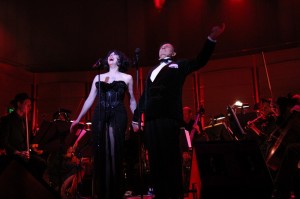
City Recital Hall, April 23
It is no coincidence that the twentieth century’s two decades of greatest creative eruption, the 1920s and 1960s, were also its most decadent. Art and decadence are candid about their affair. Only wowsers think it illicit.
Or wowsers and Nazis. During the Weimar Republic’s 14 years war-spawned nihilism soon careened into the jazz age’s mad optimism. Germany’s mostly Jewish composers siphoned dada, jazz and cabaret to generate electrifying work that the Nazis swiftly suppressed as “decadent”. Talk about pots and kettles.
In revisiting this music the Australian Chamber Orchestra, Barry Humphries and Meow Meow created one the rare genuinely successful collaborations between orchestra and extra-curricular creative partners.
Humphries melted together the roles of lecturer, raconteur, MC and entertainer. His input was like French polish on a dining table: a gloss of urbanity and wit and a hint of garishness. His anecdotes drew us into a musical world where experimentalism and the populism had combined to triumphant artistic effect.
He joined Meow Meow on some songs, and although as a singer Humphries is ultimately a fine comedian, on this material his voice deliciously amplified the sense of decadence. He also danced the Charleston and tango with Ms Meow to amusing effect.
Meow Meow was so good she was purring at the heels of Ute Lemper, the finest performer of this material I have heard live. Weill’s Surabaya Johnny exemplified what sets her apart, as she leavened the desperation and desolation with flickers of the joy that was. The ACO’s versatile principal violinist, Satu Vanska, also sang, including a kittenish duet with Ms Meow on Spolianksy’s Wenn die beste Freundin.
The innately funny chemistry between Meow Meow and Humphries (directed by Rodney Fisher) culminated in a pyjama-clad rendition of Abraham’s steamy Mousie.
But not all was laughter and zaniness. Although the music mostly buzzed with a sense of abandon, it also hinted at the black clouds massing on the horizon, encapsulated in the glistening sadness of Richard Tognetti’s violin.
City Recital Hall: April 26, 27; Concert Hall, May 3.